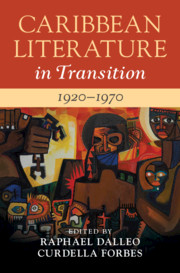Book contents
- Caribbean Literature in Transition, 1920–1970
- Caribbean Literature in Transition
- Caribbean Literature in Transition, 1920–1970
- Copyright page
- Contents
- Figure
- Contributors
- Introduction
- Part I Literary and Generic Transitions
- Chapter 1 Writing at the End of Empire
- Chapter 2 Questioning Modernism
- Chapter 3 Daily Decolonization
- Chapter 4 Towards a National Theatre
- Chapter 5 Orature, Performance, and the Oral–Scribal Interface
- Chapter 6 Explorations of the Self
- Part II Cultural and Political Transitions
- Part III The Caribbean Region in Transition
- Part IV Critical Transitions
- Bibliography
- Index
Chapter 6 - Explorations of the Self
from Part I - Literary and Generic Transitions
Published online by Cambridge University Press: 16 December 2020
- Caribbean Literature in Transition, 1920–1970
- Caribbean Literature in Transition
- Caribbean Literature in Transition, 1920–1970
- Copyright page
- Contents
- Figure
- Contributors
- Introduction
- Part I Literary and Generic Transitions
- Chapter 1 Writing at the End of Empire
- Chapter 2 Questioning Modernism
- Chapter 3 Daily Decolonization
- Chapter 4 Towards a National Theatre
- Chapter 5 Orature, Performance, and the Oral–Scribal Interface
- Chapter 6 Explorations of the Self
- Part II Cultural and Political Transitions
- Part III The Caribbean Region in Transition
- Part IV Critical Transitions
- Bibliography
- Index
Summary
The consistent tendency in Caribbean literature towards generic transgression – blurring of generic boundaries – is particularly evident in the genre of life writing, which not only spans fiction, poetry, memoir, auto/biography, essay, and theoretical formulations but also often reimagines the nature of each of these forms of writing. A comparative examination of specific works within the genre reveals a varied terrain between narrations of the individual life and a variety of communities and affiliations. The range includes Miguel Barnet’s Biography of a Runaway Slave; different iterations of the autobiographical novel exemplified in Lamming’s In the Castle of my Skin; biomythographies such as Audre Lorde’s Zami: A New Spelling of My Name, and poetic expressions such as Walcott’s ‘The Schooner Flight’, Kamau Brathwaite’s ‘Negus’, and Césaire’s Notebook of a Return to the Native Land. The possible yields of conversation between more traditional forms such as Austin Clarke’s Pigtails ’n Breadfruit and essays and genre-crossing essay collections such as Edward Baugh’s ‘Cuckoo and Culture’ and Samuel Selvon’s ‘Three into One Can’t Go’, further extend the lenses through which Caribbean autobiography may be filtered. This chapter examines multiple ways in which the autobiographical impulse appears in various traditional and crossover genres.
- Type
- Chapter
- Information
- Caribbean Literature in Transition, 1920–1970 , pp. 98 - 112Publisher: Cambridge University PressPrint publication year: 2021

